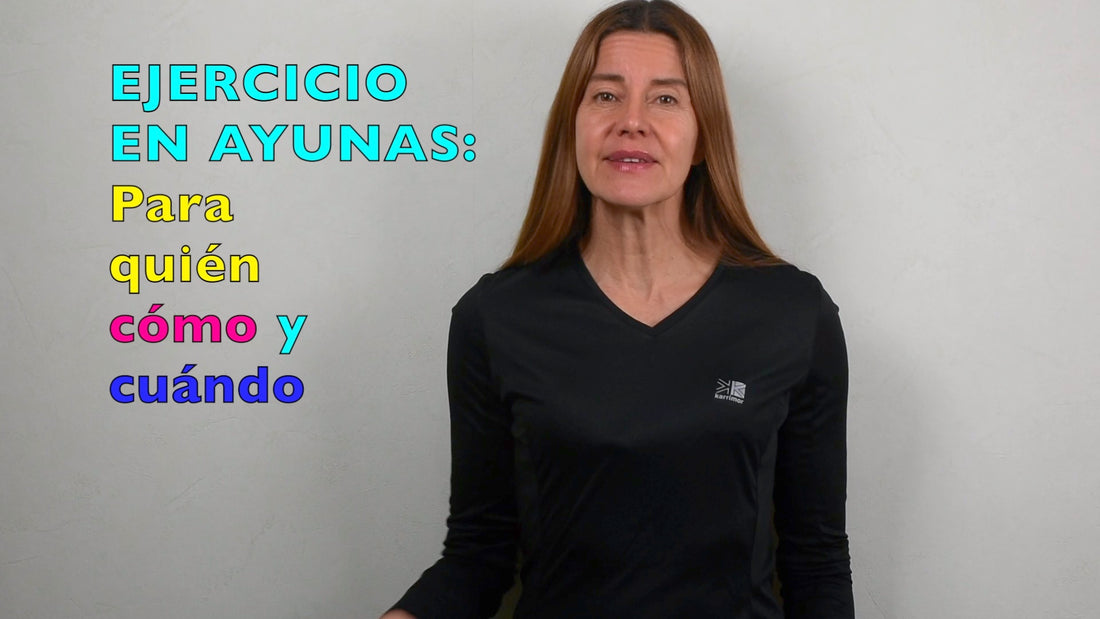
Exercising while fasting: for whom, when and how
Share
Exercising during a fasted state increases lipolysis in adipose tissue, while stimulating peripheral fat oxidation, leading to increased fat utilization and weight loss, if that's what you're after. requires at this time.
With athletes, people who exercise regularly or who are close to their ideal weight, the effects may be different and perhaps not as beneficial.
Today we will see who can benefit from fasting training, what types of exercise are most suitable and how certain times of the day can increase the beneficial effects of this practice.
People who can benefit from fasted training and how it works

Sedentary people, overweight people, as well as those who want or need to lose accumulated fat. Also, people who are just starting out or who train 3-5 times a week and have to combine it with long hours of office work, are those who can benefit from this practice. Let's see what happens inside the body.
When you have eaten less than 4 hours before exercising, your blood glucose will be high, so your body will prioritize using glucose as fuel when you exercise.
In a fasting state, however, blood glucose levels are regulated, so training in a fasting state will force the body to burn fat because it tries to preserve stable levels of muscle and liver glycogen.
This situation is very favorable for the types of people mentioned above, as exercising on an empty stomach actually helps you burn more fat while you are physically active, as it is the next best source of fuel after glucose (which the body does not have at that time). But that does not mean anything for fat loss.
It should be understood that it is caloric balance that determines whether you lose or gain weight. Just because you burn more fat for fuel does not mean you are in a caloric deficit. People who want to lose weight may then wonder why exercise in a fasted state?
Metabolic flexibility
A metabolically flexible state exists when a rapid switch between glucose and fatty acids occurs during the transition between the fed and fasted state. This flexibility in fuel choice serves to prevent hyperglycemia after a meal while ensuring that there is an adequate amount of glucose in the blood for the brain and glycolytic-only tissues during fasting.
That being said, regular practice (2-3 times per week) would eventually make you more sensitive to insulin.
Natural stimulation of Human Growth Hormone (HGH)
According to a study published by the American National Library of Medicine, exercise with brief and well-defined HGH peaks leads to a differentiated phosphorylation of STAT5 (a protein that functions as a signal transducer and activator of genetic transcription in the nucleus of cells. It participates in processes of proliferation, immunity, apoptosis , and cell differentiation). and the subsequent gene expression of IGF-I, whereas fasting induces more sporadic HCH bursts and a less differentiated but more persistent activation of the HCH signal.
This explains why the combination of exercise with fasting has more consolidated effects on the stimulation and duration of the Growth Hormone in the body than fasting alone or exercise alone.
Human growth hormone regulates metabolism and electrolyte balance; increases lipolysis and reduces fat storage in the body. Increases protein uptake and maintains the body's strength and muscle mass.
Muscle mass
The truth is that weight training on an empty stomach is not what is harmful. that many claim. A strength training session, even when done during a fasting period, will still allow you to gain muscle.
The truth is that your body has the capacity to store a lot of carbohydrates, which can be used to fuel high-intensity exercise, such as high-intensity interval training (HIIT) or resistance training.
Depending on how much muscle you have, your body can store upwards of 400 grams of glycogen, which is the name given to carbohydrates stored in your muscles and liver. It's not like your glycogen stores are depleted simply by fasting.
To gain muscle, you would need to consume about 250-500 calories more than your basic needs. This amount varies depending on your body's ability to build muscle, as well as your age, training status, type of training, and your genetic heritage, mainly.
Mitochondrial Genesis:
Restricting carbohydrate consumption has been shown to promote the production of mitochondria. The reality is that the more mitochondria your body has, the faster it can burn both carbohydrates and fat.
Types of training

Whether you follow a 5/2 protocol (eat for five days, fast for two), or 16/8 (fast for 16 hours, eat for eight), or any other version of fasting or intermittent fasting, most people who follow such an eating protocol end up losing weight.
This is because it is much harder to overeat if all of your daily calories are concentrated in an eight-hour window than if they are spread out over 15 or 16 hours. That is what makes fasting and intermittent fasting such an effective weight loss tool – by restricting the time period in which you can eat, you are also restricting the number of calories you consume.
Now, lifting weights, high-intensity interval training, or sprinting rely on good fuel sources like carbohydrates, so these activities during or at the end of a fast do work, but not 100%.
One option is to do your cardio exercises, jogging or running at 60-70% of your maximum capacity, as well as practicing yoga or pilates. While strength exercises such as weight training, high intensity interval training, as well as sprints or long runs, are more effective after breaking the fast.
Not everyone has this option, but my point is that it is best to exercise at a lower intensity during the time you are fasting and at a higher intensity once you have finished the fast, if your interest is in increasing muscle mass or athletic performance.
Training time. Yes, it also has an effect.

According to the experiments carried out so far, a person is considered to be in a fasting state when he or she has not eaten for 4-6 hours.
Training on an empty stomach first thing in the morning is not a problem because even though you are fasting, your body is rested from the night's sleep.
If you do your workout late in the day, it's not as powerful if you've fasted all day. The longer the fasting period goes on, the more likely your performance will be affected. If you leave it until the afternoon or evening before your workout, you won't be able to lift as much weight or do as many reps.
Over time, this decrease in strength means that the growth stimulus provided by a given workout is going to be weaker than it otherwise would be. As a result, muscle will be gained more slowly compared to doing the same training session with just a few meals in between.
Considering the type of fasting and the time of training, some adaptations can be made.
If you train in the morning, there is no problem with breaking the fast after training. If you exercise towards the end of the afternoon you can do what is called early food restriction , whose protocol allows you to consume your calories during the morning and start your fast at 2pm or at most 4pm-5pm.
This is a relatively new and interesting approach, because it has proven to be very effective in comparative experiments conducted to date for weight loss, fat loss, and cardiovascular health. ( article )
The other advantage of training in the afternoon is that the body is fully awake and in some way the organism and muscles are “pre-warmed up”, which provides a good physical disposition for training.
Conclusion
Can it be beneficial to train on an empty stomach?
Yes, it is okay to exercise on an empty stomach and you can do almost anything in a fasted state, and that includes lifting weights.
However, the quality of training can be compromised to some extent, depending on:
- The type of exercise you are doing
- The duration of the fast (i.e. alternate day fasting, 5:2 fasting, or time restricted feeding)
- Whether it is during fasting or after breaking the fast
The important thing about exercising while fasting is whether you need to lose weight, lose fat, or have to alternate between long hours of desk work. In these cases the combination of fasting and exercise is phenomenal.
